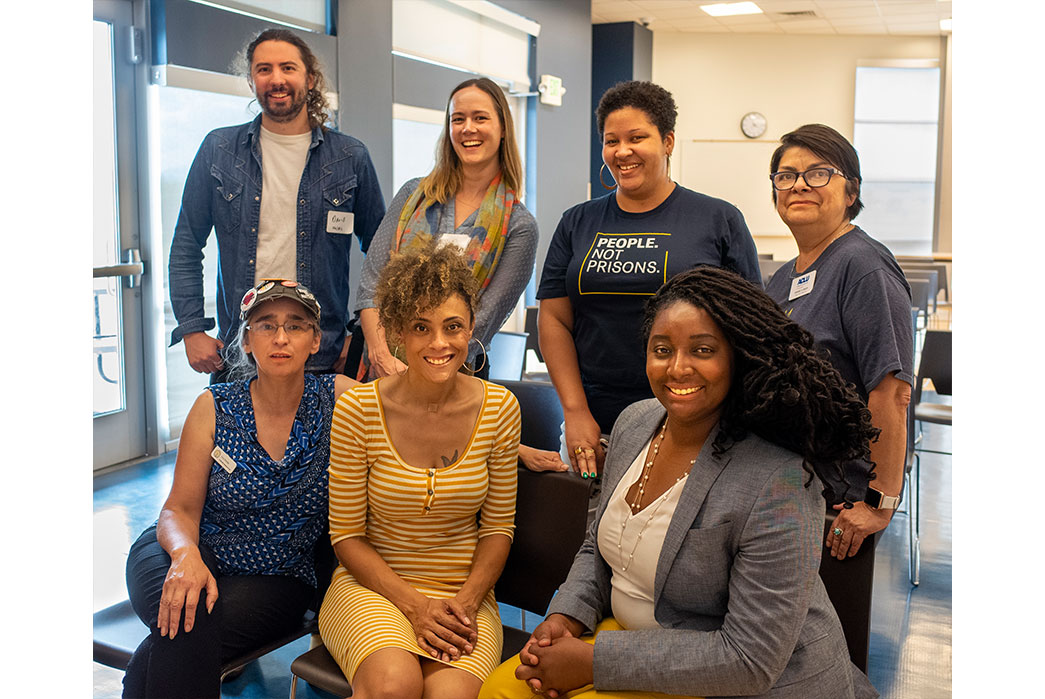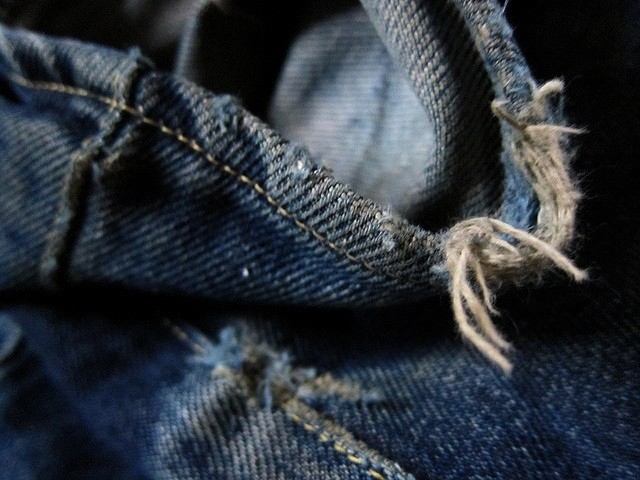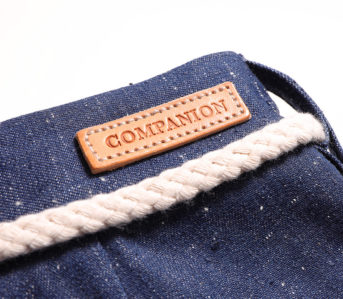So this isn’t what we normally write about, but these aren’t normal times. Cities all across the United States (and some around the world) have been in a justified uproar the past week in response to the murder of a black man George Floyd by a Minneapolis police officer. The video of Floyd’s death is extremely graphic, even compared to other videos of police brutality that seem to come weekly in America, and now our criminal justice and policing system is under a much needed spotlight the world over.
When I’m not spending my time on Heddels, I work on pretrial justice and ending mass incarceration. I started as a volunteer court watcher when I lived in New York, then as an investigator with the ACLU of Colorado and helped start Court Watch Colorado with my ACLU colleagues last fall.

Me in my Kapital denim shirt after the inaugural Court Watch Colorado training session with ACLU of Colorado Policy Counsel Becca Curry, ACLU Advocacy and Policy Counsel Portia Allen-Kyle, ACLU of Colorado Policy Director Denise Maes, ACLU of Colorado Community Education Manager Jessica Howard, and Elisabeth Epps and Eva Frickle of the Colorado Freedom Fund.
I’ve observed thousands of arraignments, canvassed hundreds of doors, read countless inmate letters, written legal memos, and frequently given public testimony before elected officials to help dismantle our racist, classist, and oftentimes cruel criminal justice system. I never really thought the Heddels and the criminal justice sides of my life would ever overlap but here we are!
A lot of people have been asking me, “What can I do to help end police brutality long term?” I imagine a lot of you are thinking that as well, so today I’m going to use my Japanese pants platform to answer that question. (We’ll get back to pants tomorrow, I promise).
1. Protest
If you can, getting out there is the most impactful thing you can do right now. Police and the criminal justice system have never been under as much scrutiny as they have been for the past week. The longer it keeps up, the more likely we are to see major changes.
Protesting can be a daunting task in normal times, the police we are protesting against are also the ones out there with tear gas, rubber bullets, and handcuffs. And getting gassed, shot, and arrested sucks! Especially right now when being amongst a large group of people puts you at risk of contracting a highly contagious and lethal virus.
If you feel up to protesting, please prepare yourself and understand the risks before going out there:
- Go with at least one other friend
- Protests can be somewhat hectic, this can help center you and help make sure both of you get home safe
- Wear a mask
- This will prevent you and others from getting sick but is also a barrier between you and pepper spray and tear gas
- Wear thick clothing that will minimize the impact of projectiles (luckily we’ve been doing this one for years)
- Wear shatter-resistant glasses or goggles
- They’ll protect you from pepper spray, tear gas, and rubber bullets; at least one person has been permanently blinded at protests this week from being shot in the eye
- Bring water
- Not only is it important to stay hydrated but it also helps wash pepper spray off your face
- Write the phone number of a local attorney on your arm
- In case you get arrested many lawyers are working pro bono for protestors, look up one in your area
2. Donate to Bail Funds
If you get charged with a crime the judge will often set bail, which is a cash value you have to put up as collateral to be able to leave jail before your case is resolved (trial, case dismissed, or you plead guilty). The amount varies from person to person and case to case, but there are tens of thousands of presumably innocent people behind bars right now because they are too poor to pay the amount to go back to their lives. I’ve seen people held in jail for weeks because they couldn’t pay a $50 bond.
Bail is an awful and questionably unconstitutional practice, but there are many organizations working to end it including bail funds, which are non-profit organizations that put up that money for people who can’t pay it themselves. This lets people keep their jobs, keep their housing, keep close to their families, and keep their freedom before their day in court.
Here is a comprehensive list of bail funds all over the country (including my friends at the Colorado Freedom Fund). You get your bail money back if you show up for your court date, so bail funds can use even a small amount of money over and over and over again to buy people’s freedom.
3. Know Your District Attorney
The District Attorney (DA) is the single most important position to affect change in the criminal justice system in your community. DA’s are elected officials in charge of all the prosecutors for a given district. This means they choose which cases to prosecute and dismiss, what charges to add to each case, whether they’ll argue for bail to be set and at what amount, and much more.
DA’s are often very lenient on charges against police officers because they need them to serve as witnesses in many other cases. Derek Chauvin, the officer who killed George Floyd, had 18 prior complaints filed against him including involvement in 3 other deaths. If any of those complaints had been prosecuted by one of the DA’s during Chauvin’s 19-year career as a police officer (including current U.S. Senator Amy Klobuchar), George Floyd might still be alive today.
Google your District Attorney and look at their record. What are the cases they choose to prosecute? Have they prosecuted any cases for police brutality? What are their practices for setting bail?
DA is a locally elected position and you as an individual can have an infinitely greater impact on its outcome than the presidential election. There has been a wave of progressive DA’s running for office the past couple of years, Larry Krasner in Philadelphia and Chesa Boudin in San Francisco have both overhauled the criminal justice system in their cities for the better. Learn about who can make your community the next place for reform.
4. Go Watch Court Sessions or Join a Court Watching Group
You should film police encounters whenever you’re able, but instances of police brutality may happen where you’re unable to observe them. Our courts, however, operate on regular schedules and are open to the public. You can walk into any criminal courtroom in the United States and just watch. This is crucial because 9 times out of 10 no one is watching and grossly illegal misconduct can go completely unnoticed.
Judges often just do what they want regardless of the law because no one will call them on it. We passed a bail reform bill in Colorado last spring that made it illegal to set bail for many low level crimes, many judges however, didn’t comply with the new law and continued to set bail for weeks after it went into effect. It took people like me and my colleagues showing up to court to document judges violating the law and the ACLU threatening lawsuits before they began to enforce it.
Many cities have organized volunteer court watching groups, where people take shifts to ensure the courts are acting appropriately and alert the public, civil rights groups, and elected officials when they aren’t. Even if you’re totally new to this, court watching groups will train you for everything you need to know anything about the process and connect you with a great group of people—I got my start as a volunteer with Court Watch NYC a little over 2 years ago.
If there isn’t a court watching group in your community, just go to court. You’ll pick it up pretty quickly and even having another warm body observing in the public gallery will often make a judge more likely to follow the rules.
5. Encourage Your Local Elected Officials to Reduce Police Spending
The city of Oakland spent 41 percent of its general budget on policing in 2017. Baltimore spends $772 per resident on police every year. The NYPD paid out $230 million in misconduct settlements last year alone.
This is our money as taxpayers.
Police spending continues to increase as every other social service is cut, even though crime is the lowest it’s been in years. Every time I see a police officer, I can’t help but think, “Would we be better served if that person was a teacher? Was a drug counselor? Was working to repair our infrastructure or building public housing?” It’s going to take a lot fewer police before I answer “no” to any of those questions.
Police department budgets are usually set by the city council of your municipality, which like DA is another hyper-local elected position that you can have a lot of influence over. Talk to your city councilor and encourage them to spend more money on education, public health, affordable housing, and a host of other social services that help us far, far more than militarized police.
6. Educate Yourself and Those Around You
Criminal law and all of its institutions are inherently complex and difficult to understand. I’ve been at it for several years and I still feel like there’s infinitely more for me to learn. Knowing the basics, though, can go a long way to empowering you to affect change in your community.
Court watching groups provide some of the best crash courses in criminal justice, but if you want to know more, The End of Policing by Alex Vitale and Golden Gulag by Ruth Wilson Gilmore are two of the best books I’ve read about the state of law enforcement and mass incarceration today.
Stay informed of what’s happening in your area as well. The reason so much of this has gone unchecked for so long is that the majority of people don’t have to interact with the most brutal parts of our criminal justice system and don’t even know they exist. Don’t look away and encourage your friends and family to stay aware as well. What we see on videos that make the national news is a drop in the bucket of what’s happening every day.
That’s a jumping off point. I hope the protests happening all over the world represent the start of a new era of reform that has been a long, long time coming.
Stay safe out there and I promise we’ll return to our normal pants and boots content, although who knows what else this year has in store for us…






